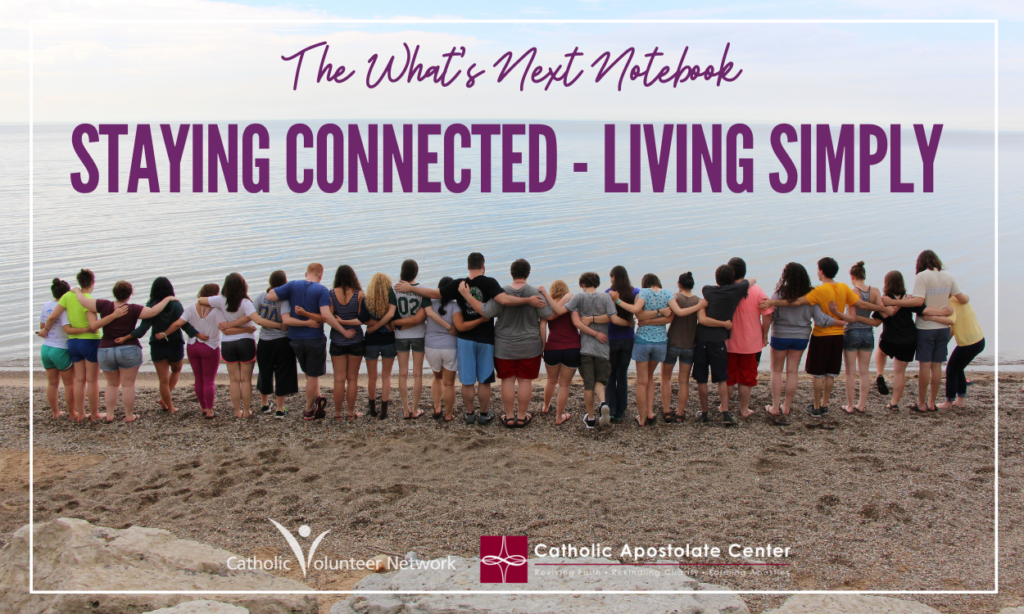This blog is part of our #WhatsNext series for former volunteers, inspired by the What’s Next Notebook resource from Catholic Volunteer Network and Catholic Apostolate Center. In each blog, we will explore helpful tips for looking back on your volunteer experience, saying goodbye, determining your next steps, and sustaining your spiritual growth during the transition to “life after volunteering.”
Living in intentional community and earning a small stipend definitely lend themselves to the practices of living simply. How can you maintain this lifestyle while earning a salary and living on your own? The good news is that there are plenty of ways to live simply outside of the volunteer experience. Here are a few suggestions:
Helpful Resources
- “Catholics Going Green,” by Walter E. Grazer, Ave Maria Press, 2009, is a guide for small groups on living out environmental justice. This booklet contains reflections on Catholic Social Teaching, discussion questions, and prayers.
- Local Harvest is an organization that helps people find farmers markets and Community Supported Agriculture (CSA) in their area. Visit www.localharvest.org for more information.
- Franciscan Action Network (www.franciscanaction.org) provides resources based on St. Francis’ teachings of care for creation and solidarity with the poor.
- Additional resources to support your journey towards simple living can be found on Catholic Apostolate Center’s Prayer and Catechesis resources page: www.catholicapostolatecenter.org/prayer–catechesis.html
Practice Being Present. One of the biggest challenges in living simply is learning to be fully present in the moment. We constantly have so many sources vying for our attention that it can be difficult to stay focused on what you are doing and who you are with. Practice being present by intentionally disconnecting from your phone and social media when you are in the company of others. When you are out for a walk, try to refrain from listening to music and instead focus on the sights and sounds all around you. This conscious unplugging will help you see the presence of God all around you.
Buy Local. Farmers markets and co-ops are not only a great way to develop a healthy, sustainable diet, they are also a great way to support the local economy and get to know your neighbors.
Care for Creation. The Church teaches that every part of the earth is good because it is a symbol of God’s constant presence and abiding love for us. Our duty as Christians is to be good stewards of these resources. Recycling, composting, and reducing energy consumption are all ways that you can take better care of the planet. For more on this topic, check out “Laudato Si – On Care for Our Common Home,” by Pope Francis, his 2015 encyclical letter encouraging responsible stewardship of our planet and environment.
Hop on the Bus. According to the EPA, transportation consumes over 28 percent of the energy consumed in the U.S., with personal vehicles claiming about 60 percent of the total energy consumption. Using public transportation helps you to reduce your carbon footprint, while also helping you get to know your city and neighbors in unique ways.
You Can’t Do It Alone. Simple living is based on the principle of inter-dependence. It recognizes that what we do has a great impact on those around us and generations to come. Seek out like-minded people who will support you in this effort to live more simply.
“The whole universe is God’s dwelling. Earth, a very small, uniquely blessed corner of that universe, gifted with unique natural blessings, is humanity’s home, and humans are never so much at home as when God dwells with them.” – Renewing the Earth: An Invitation to Reflection and Action on Environment in Light of Catholic Social Teaching, U.S. Catholic Bishops Conference, 1991
Thank you for diving into our #WhatsNext series! Next week, we will explore the theme of Staying Connected – Living Simply, in which we will reflect on the ways you can continue to practice sustainability and economy in your lifestyle outside of the context of community living.
Read more blogs in this series by visiting our blog and clicking the #WhatsNext icon!
Be sure to register and receive all our resources for former volunteers, including the What’s Next Notebook and our Weekly Job Bank, by clicking here!





 Thousands of faith-based service opportunities can be at your fingertips with the RESPONSE. Download the latest edition today!
Thousands of faith-based service opportunities can be at your fingertips with the RESPONSE. Download the latest edition today!
